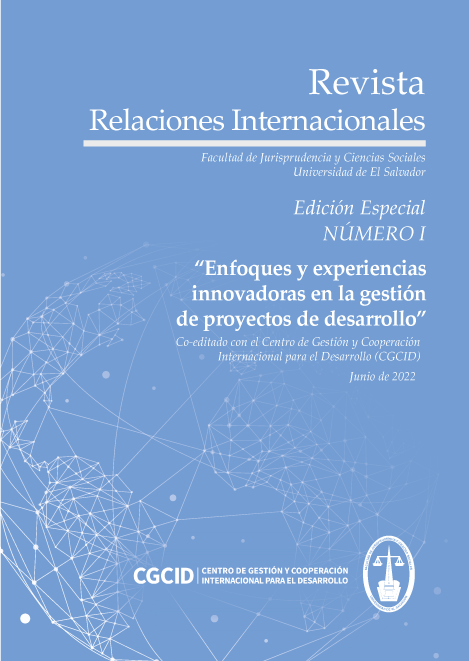Approach to the application of adaptive MEAL systems in development projects in El Salvador, challenges and perspectives in the context of the COVID-19 pandemic
Keywords:
Development projects, Project management, Resilience, Perspectives, AdaptationAbstract
Addressing development issues in contexts that evolve rapidly and unpredictably requires recognizing that they contain a certain degree of uncertainty, difficulties and unforeseen events; to analyze change from these factors in development projects is to think about how it affects them throughout the entire Project Management Cycle (PMC) and its different processes. This implies the importance of making a forecast of these factors in how and when the context will evolve and also how change can occur in a specific context. The article aims to preliminarily identify challenges and future perspectives in the context of the COVID-19 pandemic, regarding the application of adaptive monitoring, evaluation, accountability and learning -MEAL- systems in governmental institutions, Local Governments and Associations of municipalities in El Salvador, weighing on the new global challenges, such as the pandemic, in which from the beginning many interventions were affected by not having a risk-based management and therefore could be given continuity and could meet -with all the challenges that the pandemic implies- the objectives set for the projects already initiated and those that were about to start
Downloads
References
Asociación de Municipios de Los Nonualcos. “¿Quiénes somos?”. Acceso el 6 de octubre de 2021. https://www.nonualcos.org/acerca-de
Camacho, Hugo, Luis Cámara, Rafel Cascante y Héctor Sainz. El enfoque del marco lógico: 10 casos prácticos; cuaderno para la identificación y diseño de proyectos de desarrollo. Madrid, España: Fundación CIDEAL, 2001. https://olacefs.com/wp-content/uploads/2014/07/DOC_27_8_2013_Enfoque_Marco_Logico_EML_10_casos.pdf
Catholic Relief Services. Guide MEAL Dpro. A Guide to the MEAL DPro: Monitoring, Evaluation, Accountability and Learning for Development Professionals. Baltimore, Maryland: CRS, 2015. 10.
Centro Latinoamericano de Administración para el Desarrollo. Modelo abierto de gestión para resultados en el sector público. Venezuela: Revista del CLAD Reforma y Democracia, 2007. https://www.redalyc.org/pdf/3575/357533693007.pdf
Centro Nacional de las Artes. ¿Qué es un Proyecto? México: Programa de Apoyo a la Docencia, Investigación y Difusión de las Artes, 2012. https://www.cenart.gob.mx/wp-content/uploads/2014/08/Gu%C3%ADa-PADID-2014.docx.pdf
Instituto Interamericano de Cooperación para la Agricultura. Manual de Formulación de Proyectos. Costa Rica: Escuela de Formación Continua y Ministerio de Asuntos Exteriores de Finlandia. 2012. http://repiica.iica.int/docs/B3671e/B3671e.pdf
Programa de las Naciones Unidas para el Desarrollo PNUD. Informe de desarrollo humano, La verdadera riqueza de las naciones: Caminos al desarrollo humano. Madrid, España: Ediciones Mundi-Prensa. 2010.
Rosende, Iñigo y Vitoria, Oisune. Guía para la elaboración de proyectos. Gobierno Vasco: Administración de la Comunidad Autónoma del País Vasco Departamento de Educación, Universidades e Investigación, 2010. https://www.pluralismoyconvivencia.es/upload/19/71/guia_elaboracion_proyectos_c.pdf
Save the Children. MEAL planning and budgeting. Acceso el 5 de octubre de 2021. https://www.open.edu/openlearncreate/mod/resource/view.php?id=5265
Downloads
Published
Issue
Section
License
Copyright (c) 2022 Revista Relaciones Internacionales

This work is licensed under a Creative Commons Attribution-NonCommercial 4.0 International License.
The authors transfer the copyright rights in favor of the Faculty of Jurisprudence and Social Sciences of the University of El Salvador (through Aequus Editorial) to include their writing in Revista Relaciones Internacionales.








